Buying into women’s tennis was Saudi Arabia’s obvious next step but brings new questions
The WTA Finals, seen as the ‘fifth major’ of women’s tennis, will be hosted by Saudi Arabia for the next three years
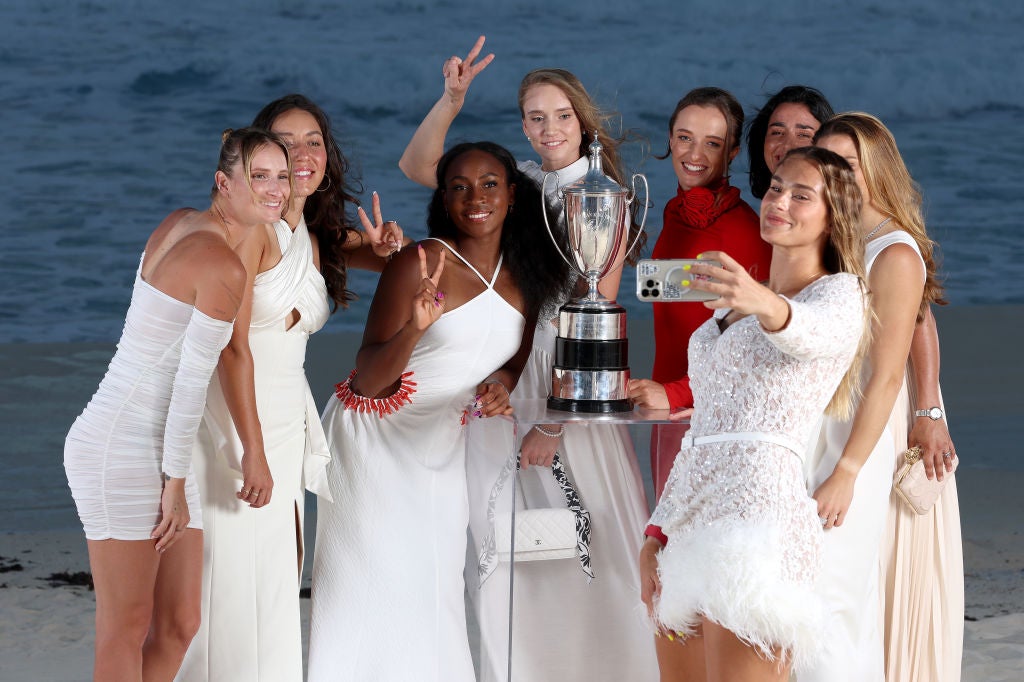
First, there was boxing and Formula One, the heaviest punches and the fastest glamour. Then came the move for football, subtle enough to start, until the bottomless pits of cash hoovered up Cristiano Ronaldo and signed Lionel Messi to a $25m sponsorship contract, as the road was cleared to the 2034 World Cup. Golf was taken over by force, next in the dizzying spree as Saudi Arabia moved to establish itself at the centre of sport. Somehow, and yet unsurprisingly, when snooker unveiled plans for a new “fourth major”, Riyadh was announced as its host.
It was inevitable, therefore, that tennis would be among the next in line. Now, the worst-kept secret in the sport is out: Saudi Arabia will host the WTA Finals for the next three years at least, adding the season-ending tournament known as the “crown jewel” on the women’s tour to its ever-expanding portfolio of major events and sporting exhibitions. It was, after all, the logical next step, and a significant one: after ploughing billions into football, F1, boxing and golf, Saudi Arabia has made its first move into elite women’s sport.
It is a deal that will sit uncomfortably with many, particularly as women’s tennis retains such strong ties to a proud history of advocating equality, women’s rights and inclusivity. Saudi Arabia, on the other hand, represents an authoritarian state where women can still face discrimination within even domestic family environments and where LGBTQ+ relationships are criminalised. The WTA was well aware of criticism from two of its greatest champions, Martina Navratilova and Chris Evert, who said in an editorial for The Washington Post that staging the WTA Finals in Saudi Arabia was a “step backward” for women and women’s sport.
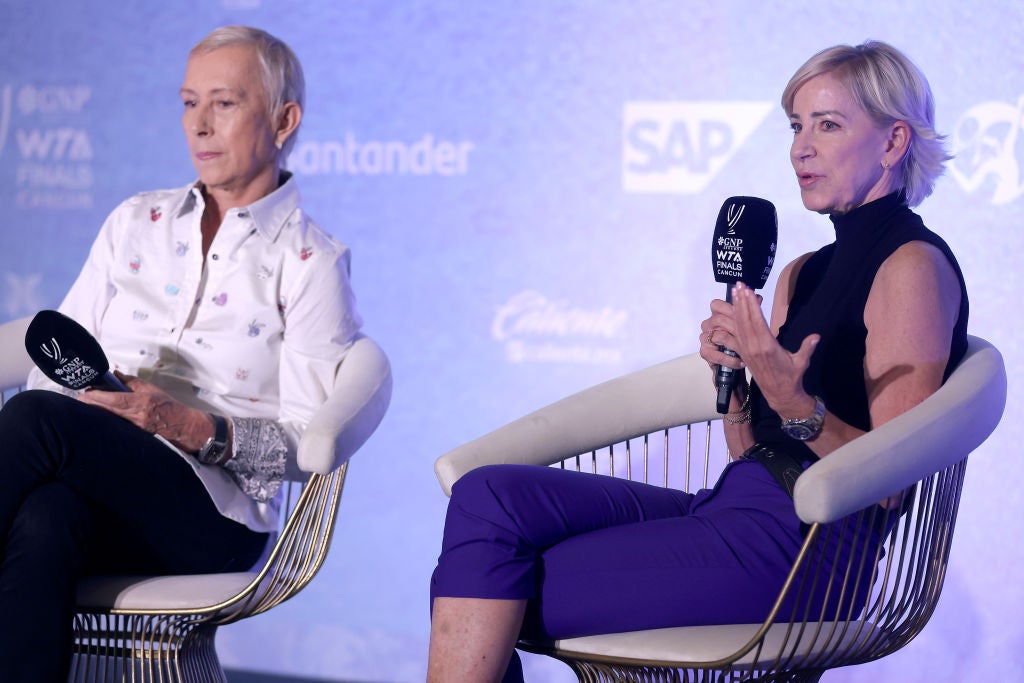
The WTA signed up anyway, tellingly without the widespread condemnation from current players that followed even the slightest hint of Saudi Arabia’s tourism board sponsoring the Women’s World Cup last year.
Money talks, after all, and the WTA found itself in a position where it was badly needed. Its chairman and CEO, Steve Simon, told the Associated Press that although he “shared the concerns around women’s rights and LGBTQ+ rights” within Saudi Arabia, the WTA’s focus was on “how we develop women’s tennis for the benefit of everybody involved in the game”. One of those who will certainly be seeking assurances, should she qualify for the eight-player season-ending finals, is the Russian world No 11 Daria Kasatkina, who came out as gay in 2022 and said last year that she held concerns about playing in Saudi Arabia.
Despite the questions and criticisms the announcement has attracted, the staging of the WTA Finals ultimately benefits Saudi Arabia. Of course, it is obvious why it would want to host such a prestigious event. Groups such as Amnesty International will say it is the latest step in the state’s efforts to “sportswash” its reputation, to cleanse itself of allegations of human rights abuses and proclaim – as Arij Almutabagani, the first elected female president of the Saudi Tennis Federation, did so in a press release – that “sport is driving much of the progress across our entire society”.
The question, really, is where? What tangible impact has sport’s influx into Saudi Arabia made on societal change? How has the arrival of Cristiano Ronaldo at Al-Nassr or the appearances of Tyson Fury and Anthony Joshua in the ring or the iron play of Brooks Koepka led to real progress for LGBTQ+ people and their lives? Activists, such as Human Rights Watch, maintain there are “serious human rights risks” for women, LGBTQ+ fans and players who attend the WTA Finals. That has not changed, despite Messi’s Visit Saudi adverts. Navratilova and Evert, when writing in The Washington Post, were justified in asking that, for once, the proof of societal change could precede the justification sports make after accepting the cash to play there.
Perhaps, though, women’s tennis believes it can be different and act as a force for good – not just wearing those empty words as a slogan. After all, Billie Jean King, one of the trailblazing founders of the WTA and a figure synonymous with the push for equal rights, both for women and the LGBTQ+ community, has supported taking the finals to Saudi Arabia. King, who is gay and married to a woman in Ilana Kloss, said change in the region cannot happen without “engagement”. Indeed, King’s comments last year appeared to soften the WTA, after initial criticism when rumours of staging the finals in Saudi Arabia first surfaced.

Meanwhile, Navratilova and Evert have been accused of holding onto “outdated stereotypes and Western-centric views” by Saudi Arabia’s ambassador to the United States, Princess Reema bint Bandar Al Saud. And an element of that is possible, too: Ons Jabeur has demonstrated, through her joyful runs to the past two Wimbledon finals and by becoming the first Arab woman to reach a grand slam final, how barriers are starting to be broken down in the region. Should Jabeur qualify for Riyadh, her impact as an Arab player could be transformative. The world No 6 had already played in an exhibition match there, against Aryna Sabalenka.
“It’s great that the WTA has decided to go and play the finals there. As an Arab woman, I am proud to be part of this,” Jabeur said to The National. “It’s time to make the change and I hope as women athletes we could do that and inspire more women in the region and around the world.”
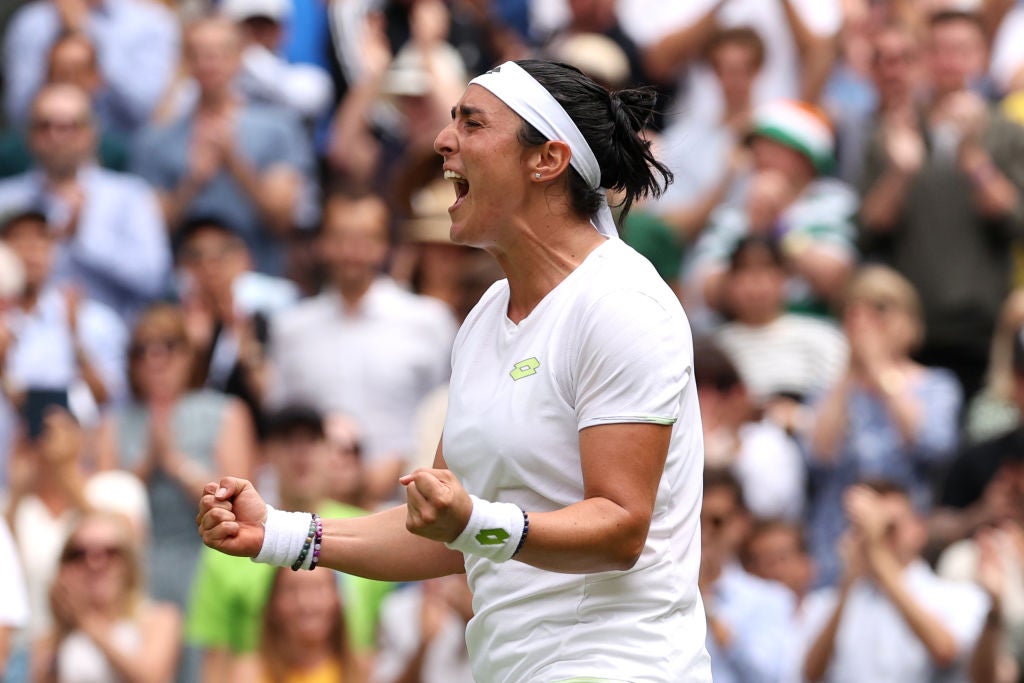
King, too, may reflect on the society that existed in the United States when she led the movement to create the WTA more than 50 years ago, and on the attitudes towards women’s sport that prevailed before she won her match against Bobby Riggs in 1973’s “Battle of the Sexes”.
But it is the legacy of King, Navratilova and Evert that led to women’s tennis becoming such an attractive proposition for Saudi Arabia to target. According to Forbes, tennis players made up nine of the 10 highest-paid female athletes in 2023, which in turn makes them some of the most influential and prominent sports stars in the world.
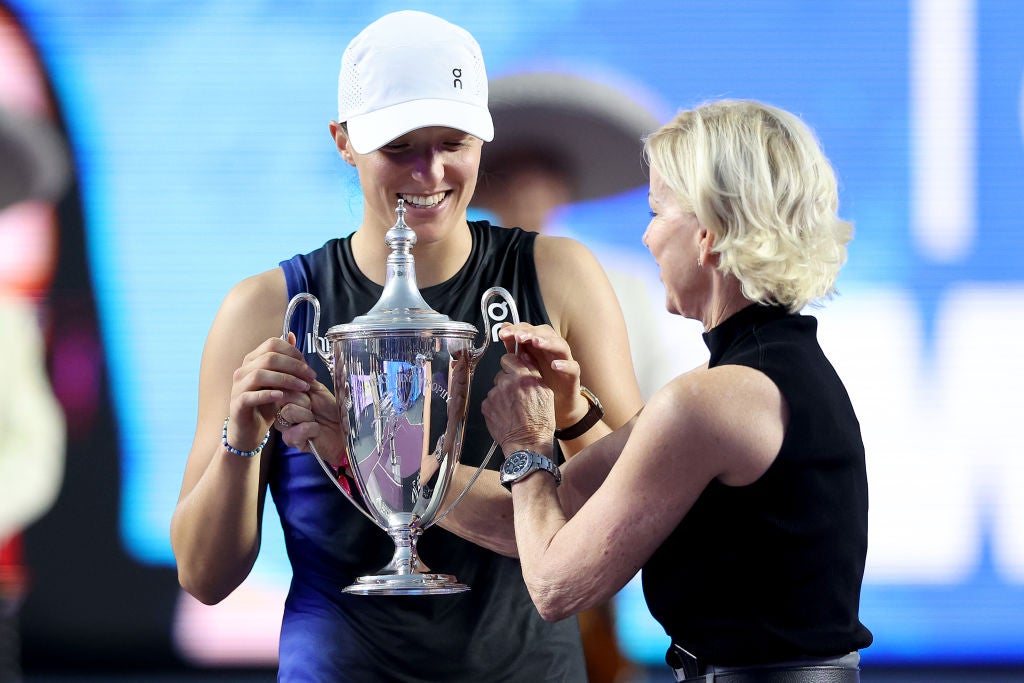
That the WTA Finals were available to buy was down to the event’s own failures, following the fiasco of Cancun last season, where players criticised the organisation. While the WTA said there were “multiple bids” to host the finals, Saudi Arabia had the means and the will to offer record prize money of £12m, an increase of 70 per cent from last year. It undoubtedly suited the WTA, after it was left in a lurch as a 10-year deal to host the tournament in Shenzhen collapsed, bringing to an end the revolving circus that saw the finals bounce unattractively from Texas to Cancun over the previous two seasons.
This was guaranteed money and Saudi Arabia offers the tournament a long-standing home; even if a three-year deal has only been signed for now, the sense is tennis is there to stay and the men’s tour will soon sign up. The ATP’s own end-of-year finale may be next once it moves on from Turin in 2025.
The question, now, is whether the WTA can live up to the legacy of King and follow through with its sentiment to enact “progress” and stimulate “engagement” within the region. Or whether, as seen elsewhere, such words are conveniently washed away following the inevitable cash grab.
Join our commenting forum
Join thought-provoking conversations, follow other Independent readers and see their replies
Comments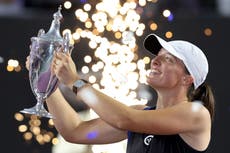


Bookmark popover
Removed from bookmarks